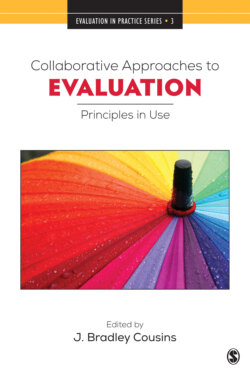Читать книгу Collaborative Approaches to Evaluation - Группа авторов - Страница 40
На сайте Литреса книга снята с продажи.
Content Focus
ОглавлениеEach field study will involve the collection and analysis of original data relative to the eight CAE Principles. We are particularly interested in issues concerning their application and utility. We have already identified for possible applications, although others are certainly possible:
Guide CAE practice in terms of planning, implementation, reporting and follow up;
Reflect on the implementation and consequences of recent CAE projects;
Review and revise or develop extant evaluation policies, or develop new policies;
Structure professional development end evaluation capacity building opportunities;
Frame research on CAE practice by, for example, using specific case applications of the CAE principles to investigate cross-cutting evaluation issues, surveying evaluators and stakeholders, developing and validating instruments to monitor and CAE practice.
From our own research we have identified a range of research questions of potential interest. No doubt a much wider range exists. By way of example only, here are some questions of interest:
Are the Principles comprehensive?
Do particular and significant omissions exist?
Are certain principles more heavily weighted in specific contexts? What are the features of context that shape such weighting?
In what ways can/do the Principles support evaluation practice?
To what extent can these Principles help to plan, or offer guidance throughout the evaluation process?
To what extent can these Principles inform stakeholders or educate nonevaluators?
To what extent are the Principles responsive to contextual complexities?
Do the Principles align with existing specific collaborative approaches to evaluation (e.g., empowerment evaluation, participatory action research, most significant change technique)? Do some principles more than others complement these specific approaches?
Are the Principles useful to novice evaluators or are they best reserved for seasoned evaluators?
Do the Principles resonate in culturally responsive evaluation contexts?
